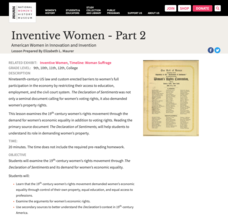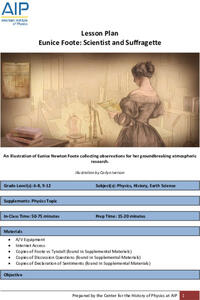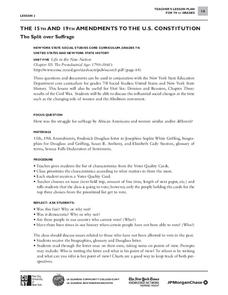National Woman's History Museum
Seneca Falls and Suffrage: Teaching Women's History with Comics
As part of the study of women's history, young scholars examine Chester Comix's strips about the Seneca Falls Convention and four 19th century leaders in the struggle for equal rights. After researching other elements of the Suffrage...
National Woman's History Museum
Seneca Falls Convention
The 1848 Seneca Falls Convention was a historic milestone in the quest for women's rights. After researching one of the participants of the Seneca Falls Convention, young historians craft and share a short presentation about their subject.
National Endowment for the Humanities
Cultural Change
High schoolers research the passage of the 19th Amendment as an illustration of the mutual influence between political ideas and cultural attitudes. They also read the Seneca Falls Declaration and explore the cultural shifts it both...
Curated OER
Catherine Blaine: Seneca Falls and the Women's Rights Movement in the State of Washington
Learners recognize the accomplishments of Catherine Blaine. In this Women's Rights Movement lesson, students research primary and secondary sources about life for American women in the 1800's. Learners trace Blaine's journey from Seneca...
Curated OER
Seneca Falls Declaration
Eighth graders discover how the Seneca Falls Convention aided women's rights. In this Declaration of Sentiments instructional activity, 8th graders use the provided worksheet to analyze the document and compare it to the Declaration of...
North Carolina Civic Education Consortium
The Nineteenth Amendment
Beginning with an exercise of favoritism to engage learners, progressing through image and primary source analysis of the Nineteenth Amendment and the Seneca Falls Declaration, and culminating in a look at a political cartoon called...
National Woman's History Museum
Songs of Protest: Seneca Falls to Vietnam
Long before the songs of the 1960's Peace Movement, long before the songs of the Civil Rights Movement, and even before the songs of the Abolition Movement, were the songs of the Suffrage Movement. To understand the power of protest...
National Woman's History Museum
From the Declaration of Independence to the Declaration of Sentiments
As part of a study of women's rights in early America, class members compare the Declaration of Independence to the Declaration of Sentiments presented at the Seneca Falls Convention. As an exit ticket, individuals explain whether or not...
National Woman's History Museum
Inventive Women - Part 2
The Declaration of Independence was published in 1776. The Declaration of Sentiments and Resolutions, modeled after the Declaration of Independence, was drafted and read by Elizabeth Cady Stanton at the Seneca Falls Convention in 1848....
American Institute of Physics
Eunice Foote: Scientist and Suffragette
The greenhouse effect and climate change are hot topics in today's news. Young scientists may be surprised to learn that the concept is not a new one. In fact, Eunice Newton Foote, scientist, inventor, and suffragette, discovered the...
Curated OER
Women's Suffrage: Their Rights and Nothing Less
Students explore women's rights. In this women's history lesson, students examine primary and secondary sources regarding the women's suffrage movement in the United States. Students compare and contrast the states' methods for achieving...
EngageNY
Grade 11 ELA Module 2: Unit 2, Lesson 5
Elizabeth Cady Stanton compares sins to monsters, using a metaphor to make a point about morality. Using the fifth of 14 lessons from the Grade 11 ELA Module 2: Unit 2 series, learners analyze paragraphs 8-10 of "An Address by Elizabeth...
City University of New York
The 15th and 19th Amendments to the U.S. Constitution
Who gets to vote? Learn more about struggles for suffrage throughout United States history with a lesson based on primary source documents. Middle schoolers debate the importance of women's suffrage and African American...
Center for History Education
Women's Rights in the American Century
Today, many young people find it hard to understand why it took over 150 years for women in the United States to get the right to vote—why there was even a need for the suffrage movement. As they read a series of primary source...
National Woman's History Museum
The Equal Rights Amendment
The debate over the Equal Rights Amendment continues. To better understand the controversy, class members research the history of attempts to get the amendment ratified. In addition, pairs engage in a structured academic conversation...
Anti-Defamation League
Women's Suffrage, Racism, and Intersectionality
The Nineteenth Amendment granted women the right to vote—as long as they were white. High schoolers read articles and essays about racism in the suffrage movement and consider how intersectionality played a role in the movement. Scholars...
Curated OER
Expansion and Reform: Applying the Declaration of Independence
Students conduct inquiries and research-acquiring, organizing, analyzing, interpreting, evaluating, and communicating facts, themes, and general principles operating in American history. They use the Declaration of Independence to...
Curated OER
Women Today: An Editorial
Students complete Internet research to write an editorial about a topic relating to the women's rights movement and the issues presently surrounding women's rights in America and around the world.
Curated OER
Hall of Fame
Students create a Hall of Fame. They discuss and study established Hall of Fames such as baseball. They participate in mock nominating and voting process for the hall of fame.
Curated OER
Women's Rights Historic Sites
Students use maps, readings, floor plans, photos and cartoons to research the conditions of upstate New York in the first half of the 19th century, examine the issues that led to Women's Rights Convention of 1848 and consider current...
Curated OER
Women’s Suffrage
Students examine several aspects of the Women's Suffrage Movement. In this women's rights lesson, students explore several primary and secondary sources regarding the events of the movement, opposition to the movement, and the effects of...
Curated OER
Confict, Consensus, and Conclusion
Students debate the key issues dealing with women's rights and the rights of African Americans during and after the Civil War. They analyze the women's rights movement in relationship to the desire for suffrage. They utilize the...
Curated OER
Voting and the U.S. Constitution (Past, Present, and Future), Part 2
Students analyze and discuss the 19th Amendment, and read the document, Why Women Want to Vote. Students illustrate statements from the handbill, then conduct a play about women's suffrage.
Curated OER
Powerful Signatures
Students experience famous historical documents that were initiated and propelled by signatures such as Declaration of Independence, U.S. Constitution. They create a school amendment using the information gathered.
Other popular searches
- Seneca Falls Convention
- Seneca Falls Convention 1848
- Seneca Falls Declaration
- Seneca Falls Conventing
- Seneca Falls Conventino























